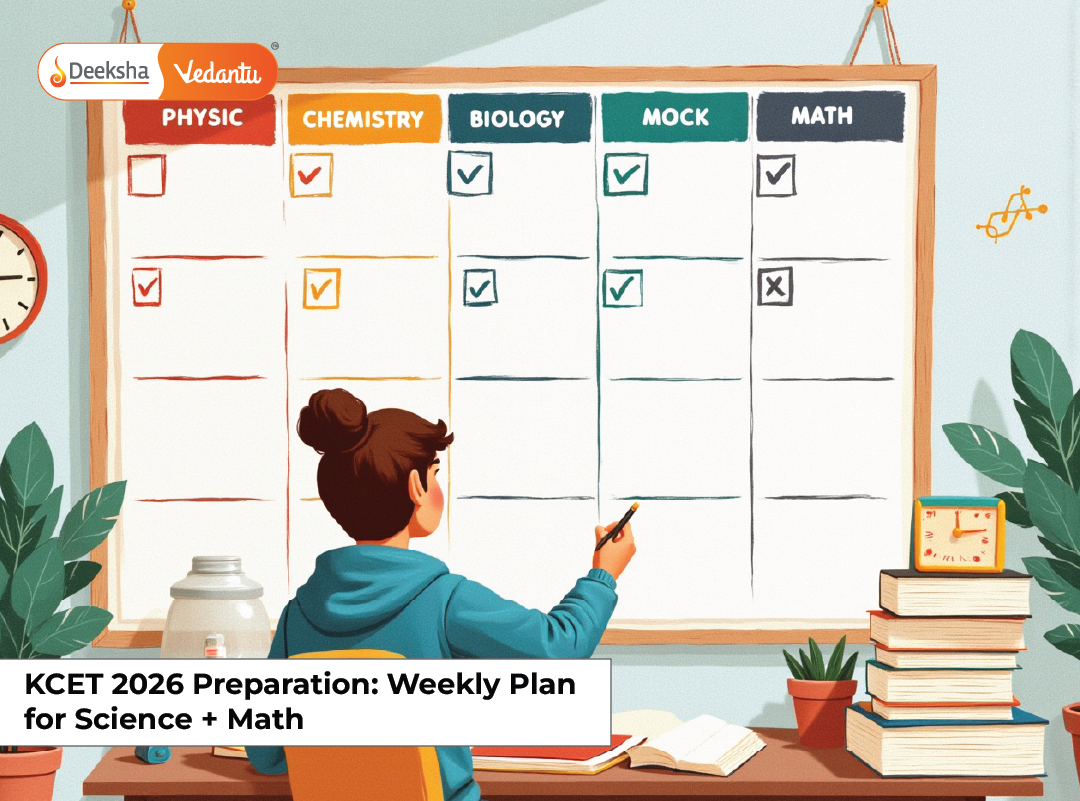Why Mock Tests Are Crucial for NEET Success
NEET isn’t just about studying hard—it’s about studying smart. Even students with a thorough understanding of Physics, Chemistry, and Biology often underperform in the final exam due to poor time management and high-pressure situations. That’s where mock tests come in.
Mock tests replicate the real exam setting, helping students adapt to the intensity, sharpen their pacing, and develop the stamina required to sit for three continuous hours without losing focus. More importantly, mock tests expose gaps in conceptual clarity, reveal common mistake patterns, and reinforce learning when followed by detailed analysis.
At Deeksha Vedantu, we’ve tracked hundreds of aspirants who saw significant improvements—some by as much as 100+ marks—after they committed to a consistent mock test routine, particularly in the final stretch of their preparation.
How Many Mock Tests Should You Take Before NEET?
There’s no universal magic number, but successful NEET toppers and Deeksha Vedantu mentors agree on a strategic range based on preparation timelines.
Minimum Recommendation:
- At least 15–20 full-length mock tests, especially during the last 3 months.
Optimal Strategy for Most Aspirants:
- Around 30–40 full-length mock exams distributed across 4–5 months.
- Additionally, solve 60–80 subject-wise and topic-specific tests to strengthen weak areas.
Advanced Strategy for Top Scorers & Repeaters:
- Over 50 full-length mock tests across 6–7 months.
- Weekly analysis sessions, revision planning based on mistakes, and increased test difficulty over time.
Remember: the goal is not to just take more tests, but to extract maximum value from each one through reflection and revision.
Ideal Mock Test Timeline for NEET Preparation
To balance learning, revision, and testing, follow a structured mock test calendar:
| Months Before NEET | Suggested Mock Frequency | Key Focus Area |
| 6–5 Months | 1 test every 2 weeks | Build test familiarity, correct conceptual misunderstandings |
| 4–3 Months | 1–2 tests per week | Improve accuracy, analyze mistakes, and revise regularly |
| 2–1 Months | 3 full tests per week | Reinforce time discipline, simulate exam pressure |
| Final 30 Days | 4–5 tests per week | Maximize confidence, minimize errors, refine strategy |
Be sure to intersperse mock tests with revision days and subject-specific practice to avoid fatigue.
How to Analyze Your Mock Test Performance Effectively
Taking mock tests without analyzing them is like practicing cricket without knowing your batting average. Post-test review is what leads to actual improvement.
1. Calculate Accuracy and Attempt Rate
- Total Questions Attempted vs. Correct Answers
- Focus on achieving 85–90% accuracy rather than over-attempting with guesswork
2. Break Down Subject Performance
- Identify which subject lags behind
- Focus your next week’s revision on these weak zones
3. Evaluate Time Spent Per Section
- Allocate 45 minutes to Biology, 55 minutes to Chemistry, and 1 hour to Physics
- Track if time overruns are causing rushed answers at the end
4. Maintain an Error Logbook
- Create a categorized notebook: Silly Mistakes, Conceptual Errors, Misreading Questions
- Write the correct explanation next to each error and revise weekly
5. Benchmark Performance Over Time
- Compare scores across tests. Are you improving?
- Identify plateaus and adjust your study plan accordingly
Common Mistakes Students Make with Mock Tests
Mock tests are powerful tools—but only when used correctly. Avoid these frequent missteps:
1. Starting Too Late in the Preparation Cycle
- Many students wait till syllabus completion, missing out on the learning-through-practice phase
- Start chapter-wise or subject-wise tests from the 6th month
2. Rushing Through Analysis or Skipping It
- Only reviewing the answer key isn’t enough—understand your reasoning errors
3. Overloading Tests Without Recovery
- Taking one test daily without analysis or rest causes burnout and low retention
4. Ignoring OMR Practice
- OMR sheet bubbling under exam stress is different—simulate this every 2–3 mocks
5. Neglecting to Simulate Actual Exam Conditions
- Avoid breaks, keep water on hand, and take the test at the same time as the actual NEET
Deeksha Vedantu’s Mock Test Ecosystem: What Sets It Apart
Deeksha Vedantu provides a unique and supportive framework to make mock testing effective, personalized, and high-yield:
- Adaptive Testing Plans: Aligned with your syllabus progress and strengths/weaknesses
- High-Quality NCERT-Centric Questions: Mock questions mirror NEET paper style and level
- Live Review Sessions: Post-mock expert walkthroughs on common mistakes and smarter approaches
- AI-Enabled Performance Dashboard: Get insights on speed, accuracy, and consistency over time
- OMR Simulation Tests: Familiarize with real-world pressure through regular OMR practices
- Peer Benchmarking: Know where you stand through percentiles and Deeksha Vedantu All India Ranks
Our mentors ensure that mock tests become a growth tool, not just a performance snapshot.
FAQs
1. When should I start taking full-length NEET mock tests?
You should begin at least 4–5 months before the exam. Initially, once a week is enough. As the exam approaches, increase to 3–5 per week.
2. Can too many mock tests lead to burnout?
Yes, if you’re not spacing them correctly or skipping analysis. Plan mocks on alternate days and include revision in between.
3. How do I improve my score after repeated low performances in mock tests?
Focus on quality over quantity. Analyze mistakes, revisit weak topics, use NCERT for clarification, and slow down during tests to minimize silly errors.
4. Is my mock test rank a true reflection of my actual NEET readiness?
Not entirely. Use it as a reference point, but real readiness depends on consistency, revision depth, and handling exam pressure.
5. Should I use mock tests from multiple platforms or stick to one?
Too many sources can confuse your strategy. Stick to a trusted, NCERT-aligned platform like Deeksha Vedantu for reliable practice.
Conclusion
Mock tests are not optional—they are essential. But more than the number you take, what matters is how you take them and what you learn from them. With every test, you should come closer to mastering speed, precision, and composure.
At Deeksha Vedantu, we understand that each student’s journey is different. Our mock test strategies are tailor-made to suit various learning styles, academic levels, and goal timelines. Whether you’re aiming for your first attempt or improving after a gap year, our structure ensures every mock leads to meaningful progress.
Start early. Stay consistent. Review every test. And most importantly—believe in your ability to improve.
Your NEET success isn’t just about knowledge—it’s about how well you’ve practiced performing under pressure. Let mock tests be your training ground for triumph.
Table of Contents














Get Social